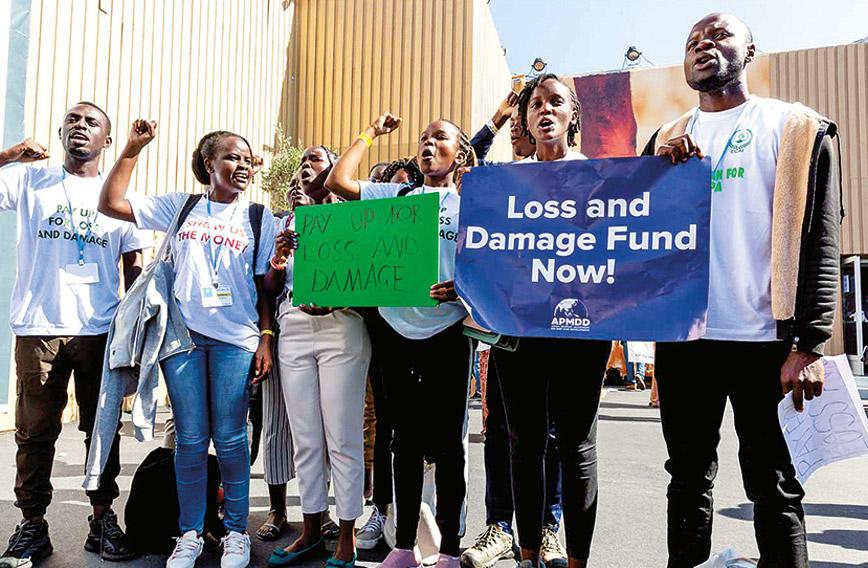
VENKATESH DUTTA
MORE and more towns and cities across the world are facing the threat of extreme flooding. Climate change is increasingly being held responsible for the rise of such extreme weather events. The connection between global warming and floods is clear. A warmer atmosphere is capable of holding and subsequently releasing more water. Rapidly rising flood waters are usually brought on by intense rainstorms in a shorter timeframe. They are called flash floods. When a river exceeds its banks and inundates otherwise dry terrain during flash floods, settlements are badly affected.
There is broad consensus among governments regarding the science behind climate change. Nevertheless, there is a lack of consensus over who is primarily accountable, how to monitor emissions reduction targets, and whether poor and vulnerable countries should be compensated for climate-related damage. Poor and vulnerable countries blame rich countries, who are the big emitters, for speeding up the rate of warming that causes such catastrophic climate events. At the recent international negotiations, they demanded a damage fund that could compensate them for the loss.
The fight for global climate justice takes formal shape inside the framework of the United Nations. Therefore, the UN Framework Convention on Climate Change (UNFCCC) has set up a yearly Conference of Parties or COP. This is the highest decision-making body under the UNFCCC that convenes once a year to review actions taken to contest global climate change.
Climate justice has been a central discourse at the annual COP. Many civil society organizations and groups have been pushing the agenda of compensating vulnerable countries for the catastrophic impacts of climate change. The most compelling impact has been floods whose magnitude, impact and frequencies have increased in South Asia.
At the beginning of September 2022, Pakistan experienced record rainfall, which caused one-third of the country to be submerged. The destruction and suffering caused by the floods cost almost $30 billion worth of damage and economic losses. Global warming had indeed intensified the impact and severity of the floods. With the horrific destruction still vivid in everyone’s mind, Pakistan joined forces with other frontline countries to advocate for financial compensation for the damage at COP27 held at Sharm el-Sheikh in Egypt. Despite the best attempts of rich countries to drive a wedge between developing countries on the issue of loss and damage, Pakistan, being the president of the G-77 plus China negotiating group, was successful in keeping poor countries unified. The message from Pakistan was clear: ‘loss and destruction is not about charity; it is about climate justice’.
Developing countries typically negotiate as a group known as the G-77 plus China, which was created in 1964. It is the largest intergovernmental organization of developing countries in the UN. Incidentally, Pakistan held the chairmanship of G-77 (which rotates on a regional basis between members from Africa, the Asia-Pacific, Latin America and the Caribbean) for 2022. In spite of its name, the group now consists of 130 developing countries. These countries came together and became the most unified and cohesive group at COP27 despite their own differences of interests, perspectives, and socio-economic settings. As part of the expanding movement for climate justice, the pressure from climate-vulnerable countries became a major force in developing a momentum around loss and damage, and unifying it under a single banner.
The floods in Pakistan sparked an argument at COP27 over who should pay for such losses. The devastating floods made it difficult for world leaders to turn a blind eye to setting up a loss and damage fund. In the negotiating rooms, there were frequent but relatively silent demonstrations calling for climate justice. The media from around the world broadcast activists and climate specialists calling out big emitters like the US, UK, European Union, and many other global leaders.
At COP27, participants reached an agreement to pay for loss and damage to vulnerable countries that had been severely impacted by climate-related disasters. During earlier COPs rich countries rejected such proposals. This time, John Kerry announced that the US would also support the creation of such a fund in principle. In this way, the US reversed its longstanding policy of opposition. This is seen as a significant step in the process of developing a specific fund to compensate for loss and damage. The G7 and the V20 (also known as the ‘vulnerable twenty’) initiated additional commitments of seed funding of over $200 million under the Global Shield against Climate Risks initiative.
Since COP26 in Glasgow, there has been rising demand for global action towards setting up a climate fund. The idea was to provide relief to poor and developing countries from extreme events and also help them in developing mitigation and adaptation against climate change. The first set of actions taken under the UNFCCC was the Kyoto Protocol, which was signed in 1997 and continued from 2005 to 2020. The Paris Agreement, which replaced the Kyoto Protocol, took effect in 2016. Despite the carbon reduction commitments by the big emitters, the Paris Agreement is not sufficient to limit a rise in average global temperature of 1.5°C above pre-industrial levels.
The warming of the planet is causing an increase in the frequency and severity of natural disasters such as floods, heat waves, wildfires, and droughts. These climate-related extreme events are causing huge loss to humans, animals and the entire ecosystem. The loss and damage fund is not even close to being perfect. For the time being, it is just an empty pot of money, built on promises. It is certain that the issue of climate loss and damage is going to remain controversial; obviously, some countries will back down from this resolution in the days to come. Despite all of its inadequacies, there is no other option. The difficult part will be working out the details with the transitional committee, which will begin its work this year.
Venkatesh Dutta is a Gomti River Waterkeeper and a professor of environmental sciences at Ambedkar University, Lucknow
Comments
Currently there are no Comments. Be first to write a comment!




